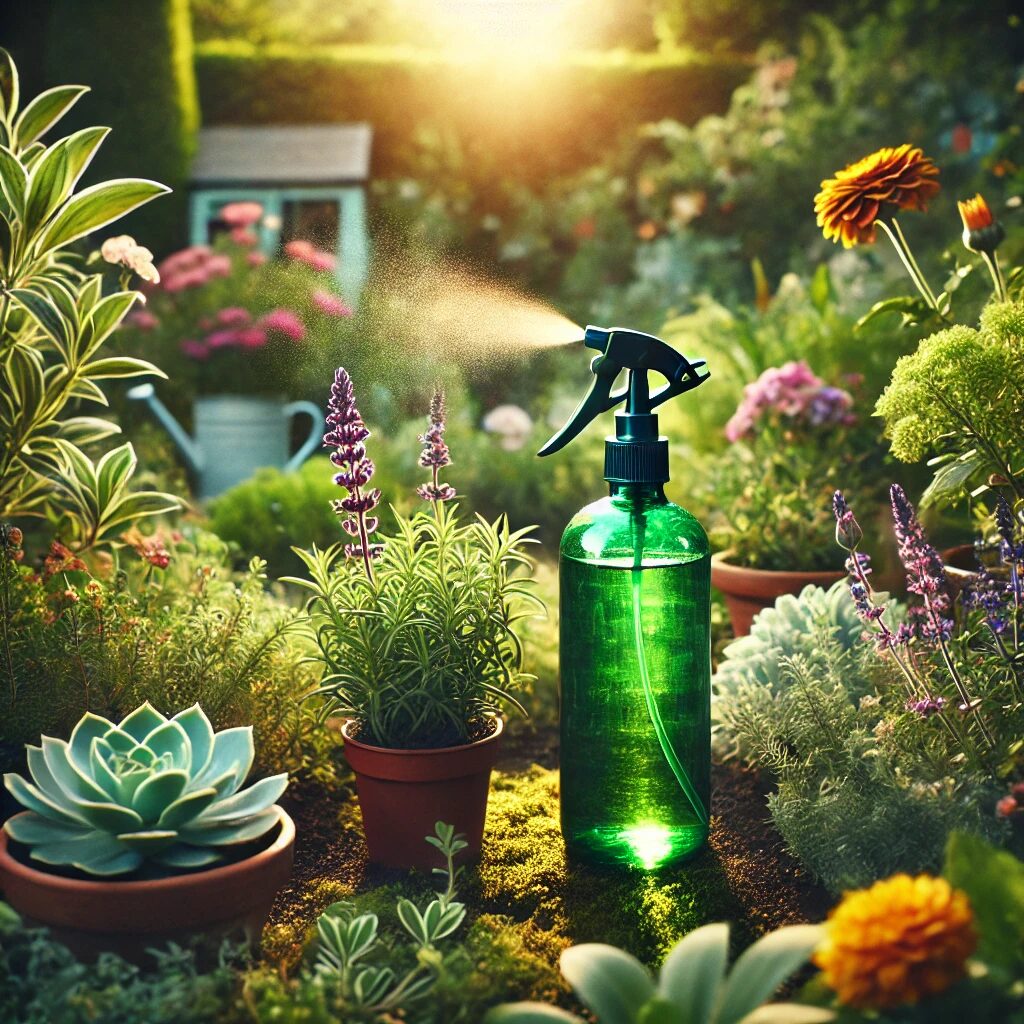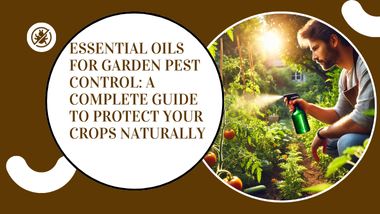
Essential Oils for Garden Pest Control offers an all-natural solution for your crops naturally, perfect for keeping insects and other pests at bay.
There’s something satisfying about finding a natural way to deal with pests in your garden. Gardening offers a connection to nature and a source of fresh produce, but it can be disheartening when pests damage your crops.
Essential oils are a chemical-free way to protect various types of crops, each with its specific pest challenges. Here’s a guide to using essential oils based on the crops in your garden.
1. Cedarwood Oil for Flea and Moth Control in Lettuce and Spinach
Why Cedarwood Oil Works
Cedarwood oil is known for its ability to deter fleas, moths, and cockroaches. In the garden, it works especially well for leafy greens such as lettuce and spinach. Fleas and moths can quickly infest these delicate crops, but cedarwood oil helps keep them at bay.
Application Tips Using Essential Oils for Garden Pest Control

- Dilution: Mix 10 drops of cedarwood oil with water and castile soap.
- Target Area: Focus on the foliage, as these pests are often found on the leaves.
- Frequency: Reapply every few days to maintain effectiveness.
Cedarwood oil also has a woodsy scent that helps repel many other pests in the garden, including those that may burrow in garden beds or near the baseboards of raised beds.
2. Neem Oil for Aphid and Beetle Control in Tomatoes and Cucumbers
Neem Oil’s Versatility
Neem oil is a highly effective insecticide for a variety of pests, including aphids, mites, and beetles. Tomatoes and cucumbers, which are commonly attacked by these pests, benefit greatly from neem oil’s all-natural repelling and insecticidal properties.
Essential Oil Application Tips for Garden Pests

- Dilution: Combine neem oil with water in a spray bottle, adding a few drops of castile soap to help dissolve the oil.
- Spray Method: Shake before each use and thoroughly spray the foliage, paying special attention to areas where you’ve seen pests.
- Other Benefits: Neem oil not only repels pests but also helps with fungal problems, making it excellent for combating common garden pests and fungus growth.
Neem oil works great for many pests in the garden, and because it’s non-toxic to beneficial insects like ladybugs, it’s a go-to choice for organic gardeners.
3. Patchouli Oil for Mosquito and Moth Repellent in Cabbage and Broccoli
Natural Defense with Patchouli Oil
Patchouli oil is effective for repelling mosquitoes, moths, and caterpillars, common pests that infest cabbage and broccoli. The earthy aroma of patchouli oil helps deter pests and also provides a pleasant scent in the garden.
Essential Oil Application Tips for Garden Pests
- DIY Spray: Mix 10 drops of patchouli oil with water and apply to the foliage.
- Coverage: Spray on both the top and bottom of leaves, as moths and caterpillars often hide underneath.
- Extra Benefit: Patchouli oil has antiviral properties, helping to keep your garden healthier overall.
Patchouli oil repels many pests in the garden, creating a natural barrier that also interferes with egg-laying processes for some insects.
4. Geranium Oil for Tick and Mosquito Repellent in Strawberries and Asparagus
Tick and Mosquito Control
Geranium oil is a powerful natural repellent against ticks and mosquitoes, making it ideal for protecting strawberry and asparagus crops. Since ticks can transmit diseases, this is a crucial addition to any garden where you or your pets spend time.
Application Tips Using Essential Oils for Garden Pest Control
- Spray Mix: Add 10 drops of geranium oil to a spray bottle with water and shake well.
- Target Areas: Spray around the base of strawberry plants and along asparagus stalks.
- Reapply Regularly: Essential oils like geranium are volatile, so reapplication is necessary every few days.
Geranium oil is also great for helping repel many pests, including those that might hide in garden beds and around areas where pets might be.
5. Sage Oil for Ant and Beetle Control in Carrots and Broccoli
Sage Oil for Ants and Beetles
Sage oil is another versatile essential oil that can deter ants and beetles. For root vegetables like carrots and leafy greens like broccoli, sage oil offers a natural defense without harming pollinators.
Essential Oil Application Tips for Garden Pests
- Spray Preparation: Dilute sage oil with water and a little castile soap in a spray bottle.
- Focus Areas: Spray around the base of carrot plants and on broccoli leaves.
- Natural Properties: Sage oil’s antibacterial properties help prevent fungal infections and keep the garden healthy.
This oil is also known to repel many garden pests like aphids and caterpillars, helping to maintain an all-natural barrier against infestations.
6. Basil Oil for Fly and Mosquito Control in Tomatoes and Bell Peppers
Dual Action with Basil Oil
Basil oil works well for deterring flies and mosquitoes, which are often attracted to tomatoes and bell peppers. It can also double as an aromatic addition to your organic garden.
Essential Oil Application Tips for Garden Pests
- DIY Spray: Mix 10 drops of basil oil with water and spray on the foliage.
- Application Areas: Spray around the stems and leaves of tomatoes and peppers.
- Other Benefits: Basil oil can help repel many pests, such as aphids and beetles, commonly found in vegetable gardens.
Basil oil also acts as an antibacterial solution, providing further pest protection and helping repel garden pests like ants and fleas.

7. Catnip Oil for Mosquito Control in Roses and Sweetcorn
Potent Mosquito Repellent
Catnip oil has been shown to be even more effective than DEET in some cases, making it a fantastic choice for repelling mosquitoes around roses and sweetcorn.
Essential Oil Application Tips for Garden Pests
- Spray Preparation: Dilute with water and spray near the base and foliage of roses and sweetcorn.
- Mosquito Defense: Reapply every few days, especially if you’re gardening in the evening when mosquitoes are more active.
- Added Benefit: Helps keep spiders and other bugs that might hide around these plants.
Catnip oil also serves as a deterrent to several other pests, helping to repel bugs naturally without disrupting the ecosystem.
8. Orange Oil for Ant and Spider Control in Potatoes and Radishes
Natural Repellent for Ants and Spiders
Orange oil is highly effective against ants and spiders, both of which can invade potato and radish beds.
Application Tips Using Essential Oils for Garden Pest Control
- Spray Method: Mix orange oil with water and apply it around the base of the plants.
- Targeted Application: Focus on entry points and areas where pests are commonly seen.
- Bonus Use: Orange oil is also an excellent natural cleaner for gardening tools and containers, adding to its utility in the garden.
This oil helps repel garden pests like aphids and beetles and offers antifungal benefits, helping to prevent common garden ailments.
9. Spearmint Oil for Ant and Fly Control in Peppers and Cucumbers
All-Purpose Pest Deterrent
Spearmint oil can keep ants, flies, and mosquitoes away from peppers and cucumbers, which are often prone to insect infestations.
Essential Oil Application Tips for Garden Pests
- Dilution: Mix with water and a few drops of castile soap.
- Spray Coverage: Apply around the base and foliage of pepper and cucumber plants.
- Extra Benefits: Spearmint oil can also deter beetles and caterpillars, making it a versatile addition to your garden.
Spearmint oil has a sweeter, milder scent compared to peppermint oil, but it’s just as effective at repelling pests in the garden.

10. Cinnamon Oil for Ant, Bed Bug, and Dust Mite Control in Beans and Zucchini
Cinnamon Oil’s Antibacterial Power
Cinnamon oil helps to repel ants, bed bugs, and dust mites that may be attracted to beans and zucchini. Its antibacterial properties also make it great for warding off fungal infections.
Application Tips Using Essential Oils for Garden Pest Control
- Spray Preparation: Mix cinnamon oil with water and shake before each use.
- Focus on Foliage: Spray on the leaves and stems of beans and zucchini to keep pests at bay.
- Additional Benefits: Cinnamon oil helps repel pests in the garden and provides a layer of protection against fungus growth.
Cinnamon oil is an all-natural solution that can repel many garden pests like aphids, mites, and beetles, contributing to a healthier, chemical-free garden.
11. Rosemary Essential Oil Spray for Pests Like Slugs and Whiteflies
One of the most versatile essential oils for gardening, rosemary oil is perfect for tackling garden pests like slugs, whiteflies, and spider mites. This herbal solution not only repels pests but also provides a lovely woodsy aroma that blends well in any garden setting.
- DIY Spray: Add 10 drops of rosemary essential oil to a spray bottle filled with water and a few drops of liquid soap.
- Target Areas: Spray this mixture around the base of plants, especially squash and other vegetables that are vulnerable to pests.
- Effectiveness: This spray is also beneficial for fungus problems. Rosemary oil has natural properties that help combat fungal infections commonly found in gardens.
12. Peppermint Essential Oil to Repel Spiders and Gnats
Peppermint essential oil is highly effective at repelling pests such as gnats and even spiders. This oil has a strong, refreshing scent that confuses insects’ exoskeleton sensors, making it difficult for them to find food or navigate.
- Creating a Spray: Mix peppermint oil with water in a spray bottle. Add a little clove oil for added potency.
- Application: Spray directly onto foliage and baseboards to keep pests like gnats and spiders away from your plants.
- Additional Benefits: Besides repelling pests, peppermint oil works to deter rodents, further protecting your garden.

13. Lavender Essential Oil to Protect Against Thrips and Attract Pollinators
Lavender essential oil not only helps to keep pests like thrips at bay but also acts as a pollinator attractor. This dual-purpose oil can help you maintain a balanced garden ecosystem by inviting bees and butterflies while keeping harmful pests out.
- Spray Preparation: Add lavender oil to water and apply it to plants prone to pest infestations, such as yarrow and other flowering plants.
- Attracting Pollinators: Lavender’s aroma is known to attract butterflies and bees, which are essential for the pollination of many garden crops.
14. Clove Oil to Ward Off Aphids and Caterpillars
Clove oil is another powerful essential oil for managing common pests like aphids and caterpillars that can damage delicate plants.
- Using Clove Oil: Mix clove oil with a carrier oil and spray it onto affected plants, paying special attention to the undersides of leaves where aphids and caterpillars are often found.
- Application Tips: This oil can also be used on pests in the garden such as whiteflies and larva. By coating their exoskeleton, clove oil can prevent larva from hatching and feeding on your plants.
15. Tea Tree Oil for Fungus Problems and Pest Prevention
Tea tree oil is known for its antibacterial and antifungal properties, making it an excellent choice for fungus problems and pest prevention in the garden.
- DIY Tea Tree Spray: Add tea tree oil to water with a dash of soap and apply it to plants suffering from fungal infections.
- Preventative Measures: This spray can also repel many garden pests, particularly those that thrive in moist conditions where fungi are prevalent.
Conclusion
Using essential oils for garden pest control is a safe and effective method to protect your plants from harmful insects.
Start with one or two oils targeted to your garden’s specific pests, and watch as these natural solutions help your crops flourish.
Essential oils not only keep pests at bay but also add a pleasant fragrance to your garden, making it an inviting space for you and pollinators alike.
